My April was full of poetry, as it should be. I’m giving myself permission not to have to write reviews for all of these, due to the level of overwhelmed I’ve been and seem to continue to be.
Poetry Books Finished
Some of these are rereads. Some I started earlier in the year and only finished in April. All of them, I loved.
1. Southern Cryptozoology: A Field Guide to Beasts of the Southern Wild by Allie Marini
2. God Went to Beauty School by Cynthia Rylant (review)
3. Terra Incognita by Jennifer Martin
4. was it more than a kiss by Chella Courington (spotlight interview)
5. A Heart with No Scars by Brennan “B Deep” DeFrisco
6. A History of the Cetacean American Diasapora by Jenna Le (spotlight interview)
7. An Animal I Can’t Name by Raegan Pietrucha
8. The Midway Iterations by T.A. Noonan
9. My Mother’s Child by Pamela L. Taylor (spotlight interview)
Read in Part (as in a poem or few)
Again, some of these I’ve read in their entirety years ago, and others are ones I just didn’t have time to delve into completely at this time.
Neat Sheets: The Poetry of James Tiptree, Jr.
Paper House by Jessie Carty
Elephant Rocks by Kay Ryan
Full Woman, Fleshly Apple, Hot Moon by Pablo Neruda
From the Standard Cyclopedia of Recipes by B.C. Edwards
Love in a Time of Robot Apocalypse by David Perez
Ceremony for the Choking Ghost by Karen Finneyfrock
The Letter All Your Friends Have Written You by Caits Meissner and Tishon
No Experiences by Erin Watson
The Woman Who Fell from the Sky by Joy Harjo
TEN by Val Dering Rojas
Dream Work by Mary Oliver
An Apparently Impossible Adventure by Laura Madeline Wiseman
Ay Nako: Writing Through the Struggle by Lorenz Mazon Dumuk
Cloud Pharmacy by Susan Rich
The Usable Field by Jane Mead
Debridement by Corrina Bain
Leaves of Grass by Walt Whitman
The Haunted House by Marisa Crawford
Everyone I Love is a Stranger to Someone by Annelyse Gelman
Domestic Work by Natasha Trethewey
Catching Up
Back at the beginning of the month, I forgot to post my reading from March, so here’s those:
1. Tooth and Claw by Jo Walton
About a year ago (or something), I read and adored Jo Walton’s Among Others, for the way it handled fairies and magic as subtle things in the world, so subtle they often go unnoticed by most people.
Tooth and Claw is nothing like Among Other, a completely different direction in style and story. The book is a comedy of manners, kind of like Jane Austen but with a society of dragons. It deals with the practical matters of such a society. From the book description:
“Here is a tale of a family dealing with the death of their father, a son who goes to court for his inheritance, a son who agonizes over his father’s deathbed confession, a daughter who falls in love, a daughter who becomes involved in the abolition movement, and a daughter sacrificing herself for her husband.”
It’s so human in the kinds of troubles the dragons have to face (which makes sense since dragon culture was influenced by the Yarge), but social manners and propriety are all greatly influenced by the biology of the dragons — a young women is gold when she is a maiden, but blushes to pink when she becomes betrothed signifying her new ability to have children (it makes for some interesting new challenges when a woman is “compromised”); the length of a dragon has a strong influence on their social position; and so on. There is more, but I don’t want to give too much away.
The only giant glaring negative to this novel was the fact that my edition had two pages that were bound wrong — page 19 came after page 22 (which took me a week to figure out) and another page toward the end was flipped upside down.
Otherwise, Tooth and Claw was a charming read, neatly pulling together the threads of all the character’s storylines into a satisfying conclusion.
2. The Lifecycle of Software Objects by Ted Chiang
This novella explores the nature of consciousness and what constitutes sentience. In the story, a set of digital pets are created and sold to users in e VR environment. While some grow bored with the creature a few become dedicated to their progress and they begin to grow their own sense of autonomy. There’s no apocalyptic machines-are-going-to-take-over-the-world elements to this. It’s more of an intellectual exploration of one possibility. It’s fascinating and sweet, and the people raising these AI pets bring them up like family.
3. The First Part Last by Angela Johnson
A young teenage boy has become a single father. He’s not ready for it and struggles to maintain his schooling and raise his daughter and is strained to the point of extreme exhaustion. But throughout there is no doubt that he loves his little girl and he will do anything for her, if he can. It’s wonderfully moving and worth a read.



